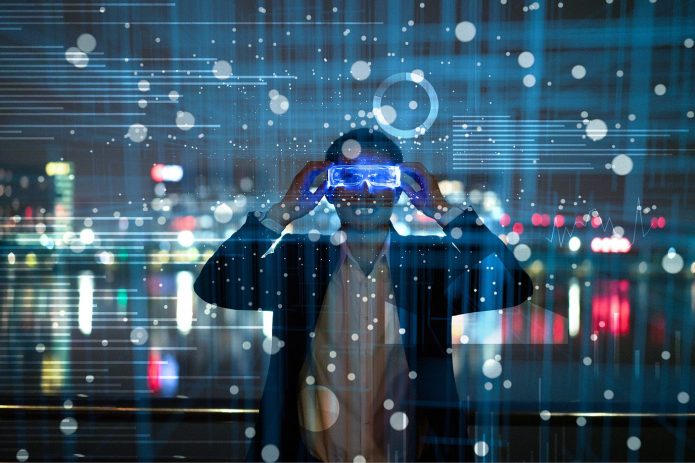Subscribe
Sign up for timely perspectives delivered to your inbox.

Everyone is talking about the metaverse. We view this with a sense of a déjà vu, having over the years witnessed companies and investors lured by the latest thematic that helps to sell an investment story. But will this time be different? The metaverse is a nebulous term; investors have created a wide range of definitions and declared who the ‘winners and losers’ will be. Fundamentally, we see a long runway for growth and some very disruptive characteristics, but it is important to point out that in the near term, the metaverse is evolutionary, with revolution likely unfolding over the longer term.
Technology adoption continues apace, driven by the convergence of multiple long-term secular growth themes. The ultimate manifestation of this convergence of some internet transformation themes, namely augmented reality (AR), virtual reality (VR) and platform proliferation is the metaverse. A virtualised digital world, parallel but also interacting with, the physical world, with secure living and working experiences.
Facebook’s rebranding to Meta Platforms was a catalyst for the emergence of the metaverse as a theme. We have often discussed the waves of tech innovation (figure 2) from the mainframe, to PC internet, and to the mobile cloud at present. Artificial intelligence (AI) and the Internet of Things (IoT) have long been described as the fourth wave, but AI has become more of an extension of big data, facilitating exponential learning using existing infrastructure, and aimed at improving how we operate in the physical world. The global pandemic created a new dynamic and school of thought – what if the next wave of innovation is in fact within the digital world itself, is not only about the convergence of technology themes, but also about the convergence of physical and digital presence?
We view the metaverse as evolutionary, like the prior shifts to the internet, mobile and cloud. The shift to the metaverse will also revolutionise certain industries with numerous potential causalities within both the tech sector and beyond. The metaverse’s link to blockchain and becoming the next iteration of the internet (Internet 3.0), with less centralised networks is potentially very disruptive to existing platform companies and it will open up sizeable, addressable markets for technology to disrupt over the next 20 years. The addressable market for the metaverse has no structural ceiling, instead it is limited by the preference for digital versus physical experiences and could extend to trillions of dollars.
The emergence of multiple use cases, devices and platforms will lead to many new and exciting companies becoming leaders in the metaverse, as well as reinvent existing tech ‘winners’. The proliferation of new wearable technologies and IoT will increase use cases. The developing use of blockchains, digital twins and digital identities will drive broader disruption in socialising, entertainment, education, construction and real estate, as well as finance. We are already seeing accelerating demand for technologies such as mapping and asset tracking, which manage the interaction of the digital and the real world, enabling omni-channel shopping and lifecycle management of goods. In fact, many Millennials and Generation Z (Gen Z) are already living in a partial parallel digital universe.
The evolution to the metaverse also has a very interesting link to sustainability. In an inflationary resource-constrained world, virtual rather than physical consumption could become a powerful enabler for decarbonisation. Digital consumption, particularly if occurring on net carbon zero platforms of large hyper scale companies like Microsoft and Alphabet (Google), might have significant environmental benefits. However, such increased digital consumption and less need for physical goods and experiences could create challenging social consequences, which will have to be closely monitored.
In the long term, the advantages that benefit large platforms such as Apple and Alphabet may be challenged, but in the short to medium term they are likely to serve as key catalysts towards the shift to the metaverse. Competition between the mega cap technology names for positioning in the metaverse will be fierce, with their financial strength used to invest in the opportunities that the metaverse presents. We believe this will become more evident in the next 18 to 24 months. Meta Platforms is investing heavily in an effort to create a new platform that unlike Facebook, Instagram or WhatsApp, does not have to run on devices and operating systems controlled by Apple (iOS) or Google (Android). The investment is both offensive and defensive of its core business (like Meta’s previous acquisitions of WhatsApp and Instagram).
Furthermore, the metaverse may not require a closed operating system, and it may not want a controlled app environment (ironically, security and privacy measures may benefit Facebook in forming a path forward). Microsoft appears well positioned for the workplace and industrial shift to the metaverse, while for consumers, Apple, Google and Facebook have an advantage. For example, Apple has precedent in leading technology shifts and integrating its hardware and software expertise, with consumers and developers eagerly awaiting an introduction to AR/VR wearables.
The predictions of trillions of dollars of addressable market will prove irresistible for start-ups and new platforms like Unity, EPIC and Roblox. All of the prior waves of innovation have been associated with hype cycles, lending to overexuberant valuations, from the dot com boom to robotics. We expect the metaverse to be no different.
While the metaverse offers significant new investment opportunities we expect that there will be over enthusiasm in investor expectations of the pace of adoption (see Figure 3 solid black line) while consumer acceptance of the metaverse will be much more consistent (dotted blue line). We are wary of the short-term hype around the metaverse, but over the longer term we view it as a shift towards the digitisation of everything, driving an increasingly broader set of opportunities for tech investors.